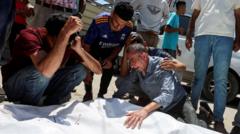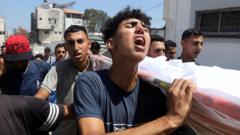As the Gaza Humanitarian Foundation (GHF) faces backlash for the high casualty rates linked to its aid distribution sites, CEO Johnnie Moore defends the operation amid accusations of misinformation and safety concerns.
Gaza Aid Operations Under Scrutiny Amid Escalating Casualties

Gaza Aid Operations Under Scrutiny Amid Escalating Casualties
The GHF's Johnnie Moore stands firm on aid distribution amidst allegations of civilian deaths near distribution points.
The head of the Gaza Humanitarian Foundation (GHF), Johnnie Moore, asserted his commitment to aiding Palestinians amidst scrutiny over the organization’s aid distribution operations following numerous civilian casualties reported in close proximity to these aid points. In a recent interview with the BBC World Service, Moore acknowledged the tragic losses but disputed the attribution of these casualties directly to GHF's activities, accusing several international bodies, including the UN, of disseminating unverified claims.
Moore’s defense comes as accusations mount against the GHF. The UN Secretary-General, Antonio Guterres, condemned the operations as “inherently unsafe,” emphasizing that no one should have to risk their life while seeking food. Reports indicate that over 500 Palestinians have died attempting to access aid since GHF began distribution late May, with claims that Israeli forces have opened fire on crowds at these sites.
In an Israeli newspaper, internal army communications suggested that soldiers were ordered to disperse crowds with live ammunition; however, Prime Minister Benjamin Netanyahu dismissed these allegations as "malicious falsehoods." The Israel Defense Forces (IDF) reiterated their stance, stating they do not condone targeting civilians and are instead working to improve safety protocols around aid distribution areas.
While GHF aims to deliver 50 million meals to Gaza, a volume described by Moore as insufficient given the population's needs, the organization has faced challenges, including a lack of verified collaboration with other humanitarian bodies like the UN, which Moore criticized for an alleged lack of transparency. The amount of aid entering Gaza is still inadequate, leaving many on the verge of famine despite recent efforts to alleviate restrictions imposed since March.
The US recently pledged $30 million to the GHF, providing essential funding in the context of heightened humanitarian need following recent conflicts in Gaza. With ongoing violence and a dire humanitarian situation, the efficacy and safety of aid operations remain central issues in assessing the response to the crisis in the region.
Moore’s defense comes as accusations mount against the GHF. The UN Secretary-General, Antonio Guterres, condemned the operations as “inherently unsafe,” emphasizing that no one should have to risk their life while seeking food. Reports indicate that over 500 Palestinians have died attempting to access aid since GHF began distribution late May, with claims that Israeli forces have opened fire on crowds at these sites.
In an Israeli newspaper, internal army communications suggested that soldiers were ordered to disperse crowds with live ammunition; however, Prime Minister Benjamin Netanyahu dismissed these allegations as "malicious falsehoods." The Israel Defense Forces (IDF) reiterated their stance, stating they do not condone targeting civilians and are instead working to improve safety protocols around aid distribution areas.
While GHF aims to deliver 50 million meals to Gaza, a volume described by Moore as insufficient given the population's needs, the organization has faced challenges, including a lack of verified collaboration with other humanitarian bodies like the UN, which Moore criticized for an alleged lack of transparency. The amount of aid entering Gaza is still inadequate, leaving many on the verge of famine despite recent efforts to alleviate restrictions imposed since March.
The US recently pledged $30 million to the GHF, providing essential funding in the context of heightened humanitarian need following recent conflicts in Gaza. With ongoing violence and a dire humanitarian situation, the efficacy and safety of aid operations remain central issues in assessing the response to the crisis in the region.




















